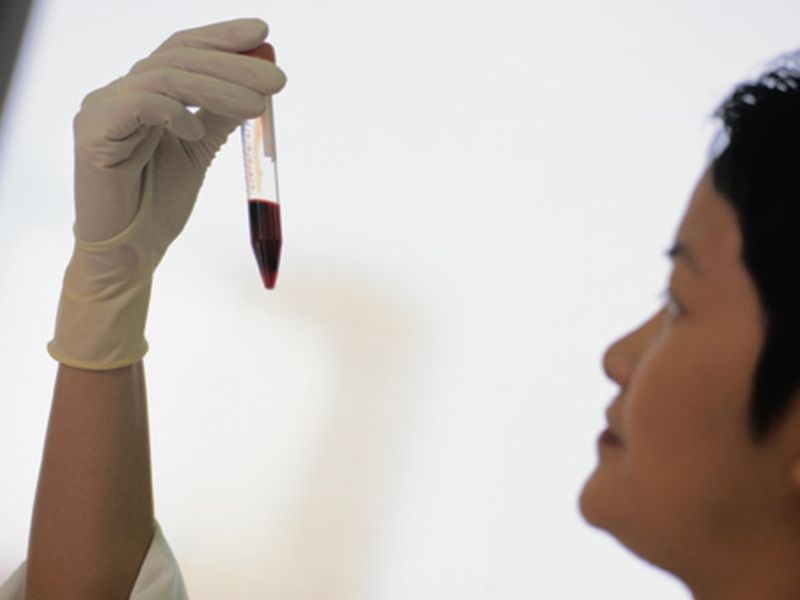|
EATURED NEWS
|
|
Blood Test Spots Early Colon Cancer courtecy;- medicinenet.com )
|
|
A blood test to detect colon cancer -- even in early stages --
seems effective and accurate.
|
Could a Blood Test Spot Early Stage Colon Cancer?
 By Alan Mozes
By Alan MozesHealthDay Reporter
(HealthDay News) -- A simple, cheap blood test to detect colon cancer -- even in its early stages -- appears highly effective and accurate, new research indicates.
The test detects so-called "circulating tumor cells" (CTCs). Researchers tested it on 620 people in Taiwan who were scheduled for a routine colonoscopy at a local hospital.
By comparing the blood test results with the colonoscopy results, the study team found that the blood test identified colon cancer in 87 percent of cases, ranging from stage I to stage IV cancer. The blood test also was able to detect 77 percent of pre-cancerous lesions indicating early stage disease.
The researchers described the test as highly accurate, noting that it correctly identified cancer 84 to 88 percent of the time. Less than 3 percent of the time did it produce a "false positive" result, which mistakenly indicates the presence of cancer when there is none.
"Because the test can easily be made available for under $150, it could potentially be offered directly to consumers and ordered by physicians, with colonoscopy being the confirmatory diagnostic," said study author Dr. Ashish Nimgaonkar.
The test is not yet available in the United States. If and when it does come to market, he said, it probably would not replace colonoscopy as the gold standard for screening. Rather, it most likely would supplant the preliminary stool-based tests that people often are reluctant to use, Nimgaonkar said.
"This test could be an option for such individuals, boosting compliance" because it has a "higher sensitivity" than the stool-based screening options now available, he said.
Nimgaonkar is a gastroenterologist and medical director of Johns Hopkins University's Center for Bioengineering Innovation and Design, in Baltimore. He and his colleagues are scheduled to present their findings Jan. 20 in San Francisco at the American Society of Clinical Oncology's Gastrointestinal Cancers Symposium.
Experts note that research presented at meetings should be considered preliminary because it has not been subjected to the rigorous scrutiny given to research published in medical journals.
Of the 620 people, all older than 20, included in the study, 438 were found to have either pre-cancerous growths, known as polyps, or colorectal cancer ranging from early to late-stage in development.
For the blood test, the researchers used about a half-teaspoon of each participant's blood. Earlier research had indicated that the test could detect very small amounts of CTCs -- as low as one CTC per billion blood cells -- with that size blood sample.
The researchers calculated that the blood test's accuracy had a "specificity value" of more than 97 percent -- meaning that any result indicating the presence of cancer or pre-cancer lesions should be considered very reliable.
Still, Nimgaonkar stressed that the blood test is envisioned as another tool in the screening arsenal rather than a replacement for colonoscopies.
"Just like stool tests, this test would not replace diagnostic colonoscopies," he said. Those "would still be the confirmatory diagnostic for positive patients and would be needed for tumor or polyp biopsy and removal and examination if a person has a positive CTC test."
Nimgaonkar said that planning is underway to launch the test in the United States, and he expects it to become available sometime this year.
Dr. Andrew Chan offered a more tempered take on the test's potential. He's a professor of medicine at Harvard Medical School and a gastroenterologist at Massachusetts General Hospital in Boston.
"These early results appear promising, but the sensitivity of the test is still not optimal. The number of patients in the study is also relatively small," Chan said.
"In the long-term, there is the possibility that this type of liquid biopsy method could be used for screening," he said. "However, I think it will require the development of more sensitive techniques tested in larger populations of patients before it will be a plausible alternative to current screening approaches."

Copyright © 2018 HealthDay
মন্তব্যসমূহ
একটি মন্তব্য পোস্ট করুন